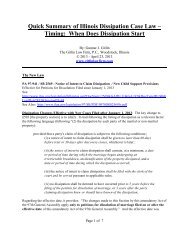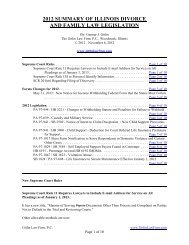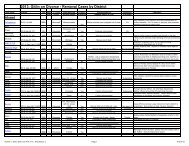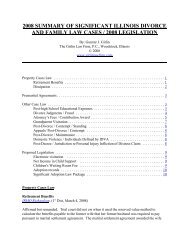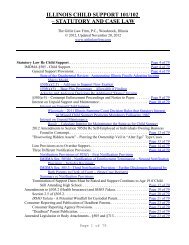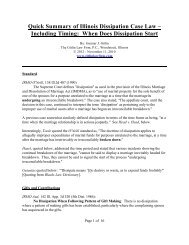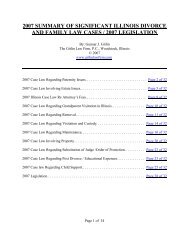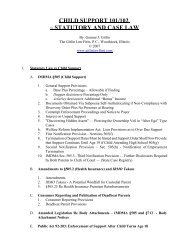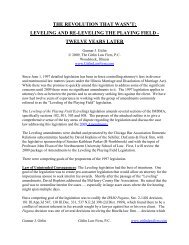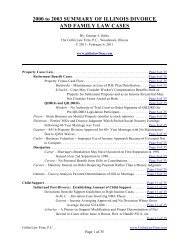Gitlin Law Firm 2008 Illinois Divorce and Paternity Case and ...
Gitlin Law Firm 2008 Illinois Divorce and Paternity Case and ...
Gitlin Law Firm 2008 Illinois Divorce and Paternity Case and ...
Create successful ePaper yourself
Turn your PDF publications into a flip-book with our unique Google optimized e-Paper software.
have the burden of showing that an exemption is inapplicable. Therefore, the<br />
respondent <strong>and</strong> third-party defendant cannot claim that the IRA is exempt from<br />
judgment. Second, even if the respondent <strong>and</strong> third-party defendant could assert an<br />
exemption, such an exemption would be overcome by a statutory exception to<br />
income exemptions for the collection of child support. Under section 12--1006 of<br />
the Code, a debtor's interest in or right to the assets in a retirement plan, such as an<br />
IRA, is exempt from judgment. 735 ILCS 5/12--1006(a), (b)(3). However, section<br />
15(d) of the Income Withholding for Support Act provides an exception to this<br />
income exemption from judgment for the collection of child support... income<br />
includes any payment from annuity, pension, <strong>and</strong> retirement benefits <strong>and</strong> that<br />
"[a]ny other State or local laws which limit or exempt income or the amount or<br />
percentage of income that can be withheld shall not apply."<br />
The next issue was whether the trial court erred when it denied the petitioner's motion for turnover<br />
of the IRA under §2--1402(c)(3) of the Code. The appellate court ruled:<br />
The petitioner argues that Gonzalez does not apply to this case <strong>and</strong> that the IRA is<br />
the respondent <strong>and</strong> third-party defendant's marital property, subject to turnover to<br />
the extent of the respondent's interest. We agree... The respondent has an actual<br />
interest in the IRA in the third-party defendant's name as it is the respondent <strong>and</strong><br />
third-party defendant's marital property. In this case, the evidence shows that the<br />
IRA was held in the name of the third-party defendant. The third-party defendant<br />
did not present evidence or argue that the IRA was nonmarital property because it<br />
was acquired before her marriage to the respondent or for any other reason. In fact,<br />
the third-party defendant did not appear to have much knowledge about this IRA<br />
account. Accordingly, we find that the IRA is marital property of the respondent<br />
<strong>and</strong> third-party defendant. Moreover, because the IRA is marital property <strong>and</strong> the<br />
respondent has a legal interest in it, we find that the IRA is subject to turnover to<br />
the extent of the respondent's interest.<br />
Comment by GJG: See also: ISBA article regarding this article.<br />
For a further comment on this case, please see: http://www.catlaw.net/Takata.htm<br />
She writes: “Takata v Hafley is a l<strong>and</strong>mark case because pursuant to Takata v Hafley deadbeats in<br />
<strong>Illinois</strong> can no longer hide their income or assets in a new spouse's name <strong>and</strong> thereby evade child<br />
support enforcement.”<br />
I ex-wife's version of facts from her web-site:<br />
“1) Ex husb<strong>and</strong> (FH) has worked for unreported income as a carpenter for most of his adult life.<br />
(2) Since his re-marriage FH has repeatedly concealed his income <strong>and</strong> assets in his new spouse's<br />
name (LH) to evade child support enforcement, <strong>and</strong> his testimony has repeatedly been found to be<br />
not credible.<br />
(3) October 2003: ex Wife (CAT) enrolls child support case in Peoria County, <strong>Illinois</strong>.<br />
The <strong>Gitlin</strong> <strong>Law</strong> <strong>Firm</strong>, P.C. Page 24 of 55 www.gitlinlawfirm.com




